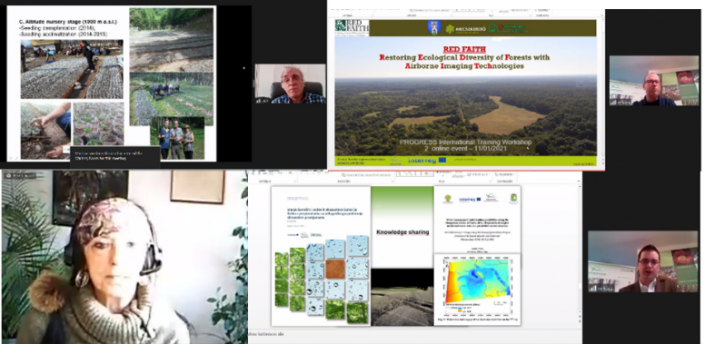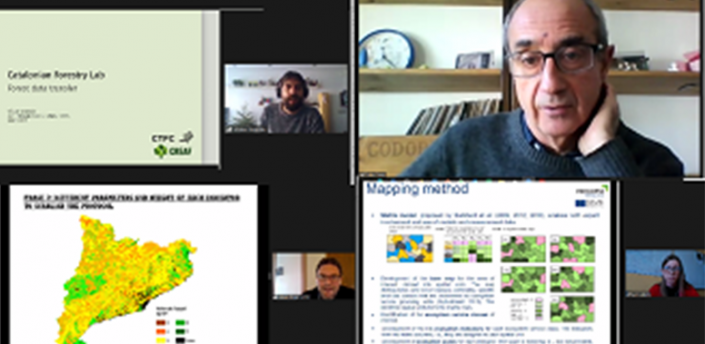2nd PROGRESS Workshop in review
The 2nd Thematic Workshop took place on the 11th of January 2021 in on-line format, organised by CREAF. The event reached a registration of 119 participants, of which 94 were on-line during the peak moment at the end of the first panel. Ireland, Latvia and Spain were the origin of most participants to the event.
The workshop was presented by Enrique Doblas (CREAF coordinator in PROGRESS), Joan Pino (CREAF director) and Besnik Mehmeti (ANCI Toscana, leader in PROGRESS).
This 2nd workshop was centred on supporting the horizontal integration of the ecosystem concerns into the sectoral policies and plans, and it was based on the work developed by the project partners to select the best good practices on this topic, which are also compiled in Handbook 2 of the project.
In Panel 1 – Engaging, Annelies Broekman (Freelance Consultor on Water Management Policies and Citizen Participation) introduced the engagement process in relation to a set of governance tools to face complex systems in innovative and more coordinated participation. For Annelies this is a consolidated field with good guidance available, and the challenges can be framed in legitimacy, take up of process results into existing institutional frameworks, and maintain the agreed compromises at the long term.
Karen Woods (Coillte Nature) presented a communication and engagement case study of the Dublin Mountains also available as a step-by-step presentation here. A clear process based on the parts of a tree, the correct identification of stakeholders (140 in this case) and addressing the engagement strategy by specific groups are three of the highlights of this case. This selected good practice is already available on video.
Finally Patricia Rovira (Barcelona City Council) presented the Barcelona Sustainability Council and the Citizenship Commitment as means to accelerate environmental change in the city, and stressed the importance of co-design for engagement.
Panel 2 – Informing was based in three case studies of data collection and dissemination. Zane Libiete (Latvian State Forest Research Institute “Silava”) presented the first study of forest ecosystem services in Latvia, where woodland represents 54% of the country lands. The study is based on international methodologies like MAES and CICES and uses a matrix model. More details are available on this presentation.
Víctor Granda (CREAF) presented the already available to the public on-line Catalan Forestry Laboratory, providing different types of meteorological, forest and ecosystem databases. He recommended using this type of platform widely, by: knowing your data, using open access tools and listing to users. This is a selected Good Practice for a video production later this year.
Finally Eduard Trepat (ARCA – Catalan Rural Development Association) presented the Study for the Definition and indicators for the characterization of the Agricultural Areas which was in the policy development that completed the Catalan Law For Agricultural Areas. A key element was the engagement of decision makers, experts and public officials in the definition of indicators.
Panel 3 – Acting completed this 2nd Workshop. Three practical examples were showcased: two from Hungary and one from Romania. Preserving and/or restoring forests and degraded habitats, using remote sensing data, or fighting invasive species were presented in detail. Sandor Sari (Mecsek Forestry Co. Ltd.) presented the RED FAITH project on Restoring Ecological Diversity of Forests with Airborne Imaging Technologies. This is a selected Good Practice for a video production later this year. Milan Kiss (Mecsek Forestry Co. Ltd.) discussed on protection of the English oak (Quercus robur) in a cross-border area, with different actions like a groundwater control system in the forest. Danut Chira (“Marin Dracea” National Institute for Research and Development in Forestry) completed the panel with his communication on conservative management of habitats in the North West of Gorj, in Gorj County – Romania.
In the web Library you can review this 2nd Workshop in 4 separate videos.
More information about project: https://buni.rtu.lv/interreg-eu-progress and https://www.interregeurope.eu/progress.







